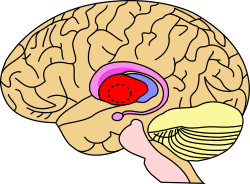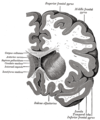Lentiform nucleus
| Lentiform nucleus | |
|---|---|
 Lentiform nucleus (in red) shown within the brain | |
 | |
| Details | |
| Identifiers | |
| Latin | nucleus lentiformis |
| NeuroNames | 1234 |
| TA98 | A14.1.09.506 |
| TA2 | 5567 |
| FMA | 77615 |
| Anatomical terms of neuroanatomy | |
The lentiform nucleus, or lenticular nucleus, comprises the putamen and the globus pallidus within the basal ganglia. With the caudate nucleus, it forms the striatum. It is a large, lens-shaped mass of gray matter just lateral to the internal capsule. Increased volume of the lentiform nuclei has been observed in obsessive-compulsive disorder, with decreased volume conversely observed in other anxiety disorders.
Structure
When divided horizontally, it exhibits, to some extent, the appearance of a biconvex lens, while a coronal section of its central part presents a somewhat triangular outline.
It is shorter than the caudate nucleus and does not extend as far forward.
Boundaries
It is lateral to the caudate nucleus and thalamus, and is seen only in sections of the hemisphere.
It is bounded laterally by a lamina of white substance called the external capsule, and lateral to this is a thin layer of gray substance termed the claustrum.
Its anterior end is continuous with the lower part of the head of the caudate nucleus and with the anterior perforated substance.
Components
In a coronal section through the middle of the lentiform nucleus, two medullary laminae are seen dividing it into three parts.
The lateral and largest part is of a reddish color, and is known as the putamen, while the medial and intermediate are of a yellowish tint, and together constitute the globus pallidus; all three are marked by fine radiating white fibers, which are most distinct in the putamen.
Etymology
The name comes from Latin and means lens-shaped, probably referring to the appearance of the nucleus from the side.
Additional images
-
Schematic representation of the chief ganglionic categories (I to V)
-
Dissection of brain-stem. Lateral view.
-
Superficial dissection of brain-stem. Ventral view.
-
Transverse section through mid-brain
-
Section of brain showing upper surface of temporal lobe
-
Coronal section of brain immediately in front of pons
-
Coronal section through anterior cornua of lateral ventricles
-
Ventricles of brain and basal ganglia. Superior view. Horizontal section. Deep dissection
-
Ventricles of brain and basal ganglia. Superior view. Horizontal section. Deep dissection
See also
References
![]() This article incorporates text in the public domain from page 834 of the 20th edition of Gray's Anatomy (1918)
This article incorporates text in the public domain from page 834 of the 20th edition of Gray's Anatomy (1918)
External links
- "Anatomy diagram: 13048.000-2". Roche Lexicon - illustrated navigator. Elsevier. Archived from the original on 2012-07-22.









